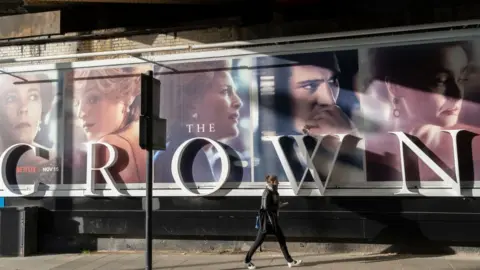How Brexit could hit British drama exports
 Getty Images
Getty ImagesThe UK may have departed the EU stage, but its sparkling film and TV productions keep winning over audiences across the continent and indeed the globe.
Jewels such as The Crown and Downton Abbey have scooped scores of awards and brought in billions in sales for the UK's creative industries.
But some EU countries are worried that Britain, now a "third country" in Brussels speak, is unfairly cashing in on the rewards of selling its programmes as European, even though it's left the club.
Last year, EU countries agreed that 30% of offerings on streaming services such as Netflix and Amazon Prime should be European-made.
The concern among some EU capitals is that currently the UK makes up the vast majority of that 30%, despite Brexit.
This month, EU diplomats were invited to discuss whether the "privileges" the UK continues to enjoy were appropriate. They were given a briefing paper, seen by the BBC, which warned that the "disproportionate" prominence of British productions could be a threat to the "cultural diversity" of the European Union.
'General dissatisfaction'
It's a concern for Max Rumney, deputy CEO of PACT, the trade body that represents TV and film producers in the UK, who thinks the industry is being "lumped in with the general dissatisfaction with the British" and Brexit, fishing and sausage rows.
He fears any move to remove European status from UK programmes would make it much harder for producers to raise funding for filming.
"My personal view is that it's a bit of a stupid tactic for the EU to take," he said.
"The EU is saying that they want more European content but people will watch what they find compelling and entertaining and will find ways of doing that - we see that with younger audiences particularly."
Max Rumney believes mainland European viewers would suffer and "legislating to exclude certain type of content and programmes is not really how to deal with audience engagement".
 Getty Images
Getty ImagesBritish programmes are still classed as "European works" because the UK remains a member of the Council of Europe - an organisation set up after World War Two to promote democracy and human rights. And the European Commission continues to use the Council of Europe's definition that the works of its members are "European."
Let's be clear, the final curtain isn't imminent for UK period dramas being watched in Paris, Madrid and Rome.
EU diplomats from the member states have now asked the European Commission to evaluate just how much British content is available on video-on-demand platforms across the EU as part of a previously announced review on the media landscape.
That report is not expected before the end of the year and it may not be for another three years - when the EU's Audiovisual Media Services Directive - comes up for review that serious attempts are made to change the UK's status.
Some in Brussels wonder whether there's a twist to this plot. That the plan is not to banish British movies, but to highlight how UK film and drama is dominating the field, and so make a case for greater investment for creative industries in mainland Europe as they try to emerge from the pandemic.
